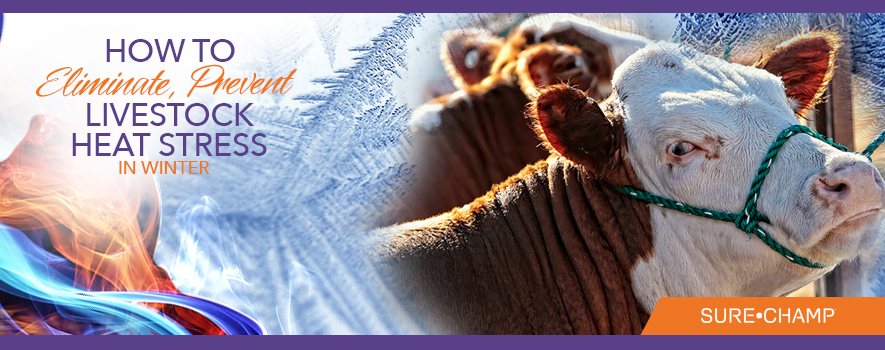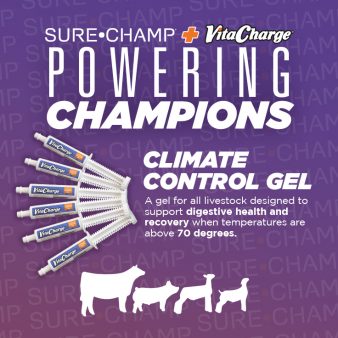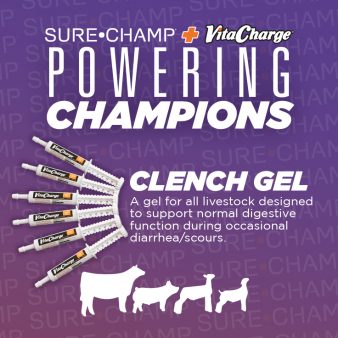
Winter temperatures have settled in. You’re focused on keeping cattle fed, water tanks thawed for your livestock, and hoping that old show heifer doesn’t calve in snow bank and end up with a baby with frozen ears. Heat stress in your show animals seems like a distant challenge to think about in another six months. However, heat stress occasionally occurs in the winter. Although the temperatures are not as extreme, the stress can have a greater effect because of the dramatic fluctuation in temperatures.
One of the primary causes of heat stress in the winter is the digestive system working overtime to break down the feed. Exhibitors often feed a higher-energy diet to meet nutrient requirements in the colder months. Therefore, the rumen works extra hard to break down the feed, creating extra internal heat in the animal.
Because temperature is not the only measurement associated with heat stress, show livestock tend to express signs of heat stress more often than livestock in their natural habitat. Heat stress is related to ambient temperature along with humidity and air movement. When the humidity increases the animal’s evapo-transpiration is reduced, and it cannot cool itself. This inability to cool itself increases the core body temperature.
“When we lead these haired-up show cattle in to a hot, humid barn with little air movement from the cool tie-outs, their body temperatures increase significantly,” said Blaine Rodgers, Show Livestock Business Development & Field Support for BioZyme® Inc. “Livestock start to experience heat stress at 70-degrees, and we know from personal experiences those barns can be hotter than 70. We also need to remember that their rumen is working extra hard to break down their feed, raising their internal temperature even more.”
Besides digestion and extreme Temperature Heat Indexes (THI) created in hot, humid barns, other causes of heat stress at winter shows include extreme temperature shifts when traveling between climates and altitudes and walking long distances from tie-outs into a hot barn. Traveling to a show in a poorly ventilated trailer can also cause unneeded heat stress.
Heat stress can wreak havoc on your show animals’ overall health, causing challenges with their digestive, respiratory, immune and reproductive systems. Livestock will go off feed and water when they are stressed, they start to breath heavily, which can lead to other respiratory issues. As well, their immune system is compromised leading to other health challenges.
However, heat stress doesn’t need to stress you out. With proper planning and preparation, you can mitigate the heat stress that your animals experience and keep them healthy and performing, even on the show road. Vita Charge® Climate Control Gel helps all show livestock handle heat stress by lowering the animal’s body temperature in a safe, fast, and natural way. Climate Control works as a vasodilator that widens the blood vessels, increasing blood flow and thus cooling the body.
In addition, Climate Control contains Amaferm®, is a prebiotic designed to enhance digestibility by amplifying the nutrient supply for maximum performance. It is research-proven to increase intake, digestion and absorption. As Amaferm aids in digestion, that decreases the amount of work the digestive tract has to do, therefore lowering the body temperature caused by digestion.
Climate Control is a gel that is administered orally. It is designed for and safe to use on cattle, sheep, goats and hogs. It is recommended to be given two-three days prior to traveling to the show, and then daily while at the show when in a warmer, more humid climate.
Other ways to make sure your livestock stay cool include putting up fans in the barn, rinsing animals, and making sure they stay hydrated with plenty of fresh, cool water. Don’t forget to keep your trailer properly ventilated while traveling, and even though it seems cold outside, cattle especially need that ventilation as they will generate body heat in an enclosed trailer while going down the road, just like humans put off body heat when they are in an enclosed area.
Sure Champ Climate Control will help regulate your livestock’s body temperature, which keeps them eating, healthy and performing. Don’t let heat stress get you down in the winter or any season. Be proactive and plan to control heat stress early on with Climate Control.

